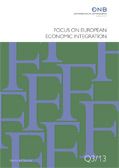Focus on European Economic Integration Q1/18
 OeNB
OeNB
- Erschienen:
- März 2018
 OeNB
OeNB
Call for applications (PDF, 56 kB) en 01.03.2018, 00:00:00
A cost-risk analysis of sovereign debt composition in CESEE (PDF, 771 kB) Beer. Drawing on a newly compiled structural debt database, this article examines sovereign interest rate exposure in ten countries in Central, Eastern and Southeastern Europe (CESEE). The average maturity of sovereign debt has lengthened over time and converged across CESEE, indicating that the likelihood of sudden changes in interest rate has decreased since 2009. Using a simple theoretical model, this article identifies the drivers of this development, highlighting the role of debt managers’ risk preferences. en debt management, interest rate risk, financial vulnerability, CESEE region H63 01.03.2018, 00:00:00
A geographic perspective on banking in Central, Eastern and Southeastern Europe (PDF, 1,1 MB) Beckmann, Reiter, Stix. This study presents a novel dataset covering the geographic locations of bank branches in ten Central, Eastern and Southeastern European (CESEE) countries. Based on these data, we describe the spatial provision of banking services and study whether domestically owned and foreign-owned banks show different branching behavior. We find that the provision of banking services varies substantially between and within countries. Regressions show that these differences strongly correlate with the respective countries’ GDP per capita. With regard to the question whether foreign and domestic banks show different branching behavior, we detect marked differences across countries. Thus, there is no “one-size-fits-all” explanation for the market behavior of foreign (and Austrian) banks in CESEE. In general, foreign banks in CESEE tend to branch in regions with higher population density. An exception among foreign banks are Austrian banks, which, on average across regions, also locate in areas with lower population density. When we match bank branch location data with household survey data, we find that the majority of CESEE households have a bank available within 2 km. Nevertheless, a sizeable share of CESEE households live 5 km or farther from the nearest bank branch. We provide indicators of bank branch coverage, density, concentration and ownership at Nomenclature of Territorial Units for Statistics 3 (NUTS 3) level for download on the OeNB website. de bank branches, local market structure, spatial competition, foreign banks, Central, Eastern and Southeastern Europe, database D12, G11, D80 01.03.2018, 00:00:00
How are reduced interest rate differentials affecting euroization in Southeastern Europe? Evidence from the OeNB Euro Survey (PDF, 463 kB) Scheiber, Wörz. Euroization is a widespread phenomenon in many Central, Eastern and especially Southeastern European countries. From the literature on euroization we derive potential implications of the recently observed reduced interest rate differential between local and foreign currencies for households’ demand for cash holdings, foreign currency deposits and foreign currency loans. We contrast these hypotheses with recent changes in households’ observed saving and borrowing behavior in the region. To this end, we combine information from the OeNB Euro Survey with data from national central banks. The different dynamics of asset and liability euroization observed in the recent period of reduced interest rate differentials in the euroized countries of Southeastern Europe by and large match the theoretical expectations. Based on the literature and the data compiled in this article we conclude that fostering trust in institutions, sustaining macroeconomic stability, providing incentives for saving in the local currency and pursuing a comprehensive policy mix of macro- and micro-prudential measures will help to maintain financial stability and to reduce euroization. de euroization, interest rate differential, household financial decisions, Southeastern Europe D14, G11, G18, E43, F34 01.03.2018, 00:00:00
Conference on European Economic Integration 2017: A modern take on structural reforms – past and future challenges for CESEE and Europe at large (PDF, 154 kB) en 01.03.2018, 00:00:00
Olga Radzyner Award winners 2017 (PDF, 71 kB) en 01.03.2018, 00:00:00